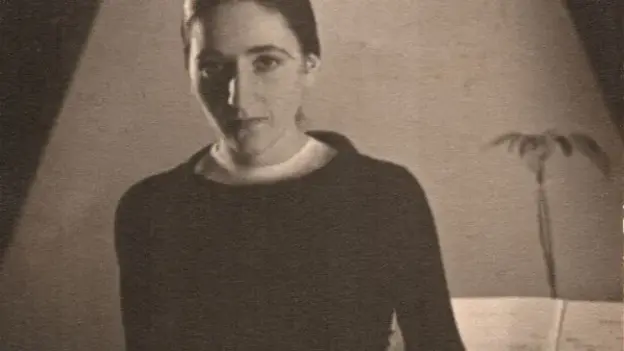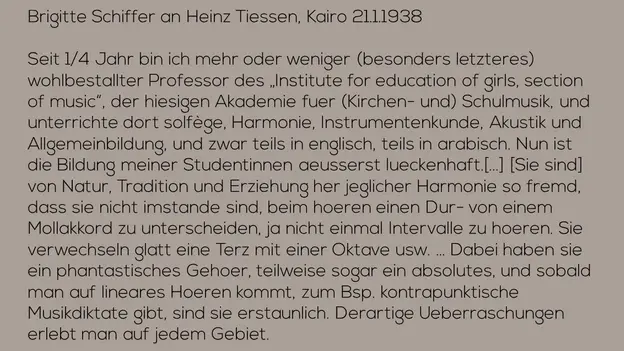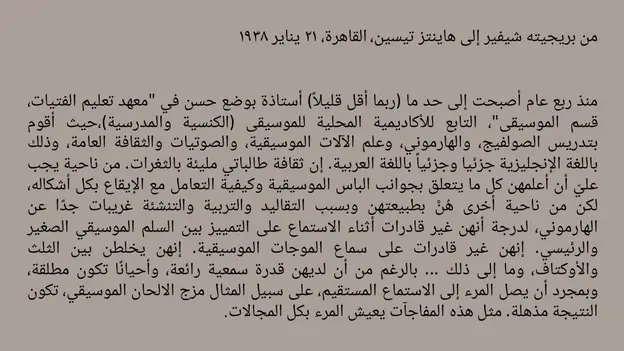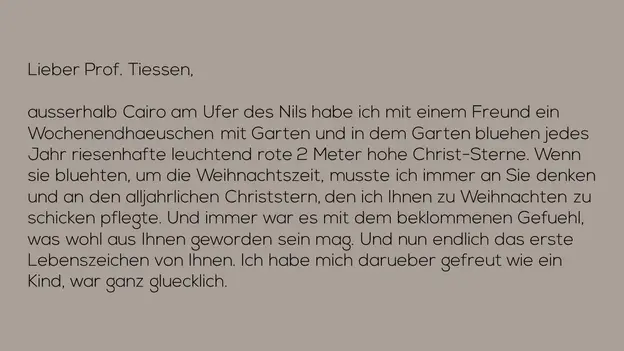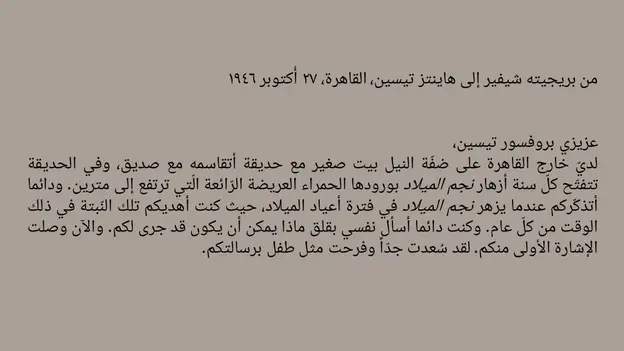Tandem Project
Brigitte Schiffer: Letters from Cairo
Publication
Translation as a means to spread knowledge and instigate discussions is a major driving force behind this project by AGYA members Ikram Hili and Matthias Pasdzierny.
Brigitte Schiffer (1909-1986) is a precious find in this regard, as she bridges European and Arabic music cultures and stands for an attitude that could be described as postcolonial avant la lettre: Schiffer developed numerous concepts with the help of which she tried to bring together music theory, musicology and composition from ‘East and West’ as complementary elements. Various publications, her own compositions and, above all, her numerous letters provide information about her ideas and work.
After her studies of musicology, composition and philosophy in Berlin, Brigitte Schiffer had to flee from Nazi persecution in 1935 and returned to Egypt where she had been living with her parents from 1923 to 1929. She soon held influential positions in Cairo's musical life. Schiffer spent the following 30 years of her career as an educator and music journalist in Egypt. During this time, she wrote numerous letters to her friends in Germany about her personal life, her acquaintance with artists and intellectuals from the city’s cosmopolitan cultural environment and her professional experiences as a director and teacher at the Institute for the Education of Girls and high-ranking employee at the Egyptian Ministry of Culture.
The translation and publication of selected letters from German to Arabic aim at stimulating the discussion about artistic and intellectual exchange processes and the role of European migrants in the cultural life of their Arab host countries, particularly Egypt, in the first half of the twentieth century. A particular focus lies on the internationalization of musical culture after 1945, the conditions and effects of the cultural cold war, and, above all, the situation of New Music and music education in Egypt and the Arab world in general. At the same time, the publication wants to instigate reflections on transnational historiography by acknowledging the importance of translation processes for the transfer and exchange of knowledge.
The project also aims to show the possibilities and limits of translation and the translatability of culture, primarily from the field of music: Schiffer was fluent in five languages, including Arabic. In her letters, she made numerous mistakes due to language shifts. These mistakes are intentionally going to be preserved and commented on in the translation as they allow new, meaningful perspectives with regard to music and music theoretical concepts.
The following extracts from two of Schiffer´s letters give an idea about her writing style and the topics she addressed. Her letters are currently being translated into Arabic by Mustafa Al-Slaiman.
Brigitte Schiffer an Heinz Tiessen, Kairo 21.1.1938
Seit 1/4 Jahr bin ich mehr oder weniger (besonders letzteres) wohlbestallter Professor des „Institute for education of girls, section of music“, der hiesigen Akademie fuer (Kirchen- und) Schulmusik, und unterrichte dort solfège, Harmonie, Instrumentenkunde, Akustik und Allgemeinbildung, und zwar teils in englisch, teils in arabisch. Nun ist die Bildung meiner Studentinnen aeusserst lueckenhaft.[...] [Sie sind] von Natur, Tradition und Erziehung her jeglicher Harmonie so fremd, dass sie nicht imstande sind, beim hoeren einen Dur- von einem Mollakkord zu unterscheiden, ja nicht einmal Intervalle zu hoeren. Sie verwechseln glatt eine Terz mit einer Oktave usw. … Dabei haben sie ein phantastisches Gehoer, teilweise sogar ein absolutes, und sobald man auf lineares Hoeren kommt, zum Bsp. kontrapunktische Musikdiktate gibt, sind sie erstaunlich. Derartige Ueberraschungen erlebt man auf jedem Gebiet.
من بريجيته شيفير إلى هاينتز تيسين، القاهرة، ٢١ يناير ١٩٣٨
منذ ربع عام أصبحت إلى حد ما (ربما أقل قليلاً) أستاذة بوضع حسن في "معهد تعليم الفتيات، قسم الموسيقى"، التابع للأكاديمية المحلية للموسيقى (الكنسية والمدرسية)، حيث أقوم بتدريس الصولفيج، والهارموني، وعلم الآلات الموسيقية، والصوتيات والثقافة العامة، وذلك باللغة الإنجليزية جزئيا وجزئياً باللغة العربية. إن ثقافة طالباتي مليئة بالثغرات. من ناحية يجب عليّ أن أعلمهن كل ما يتعلق بجوانب الباس الموسيقية وكيفية التعامل مع الإيقاع بكل أشكاله، لكن من ناحية أخرى هُنَّ بطبيعتهن وبسبب التقاليد والتربية والتنشئة غريبات جدًا عن الهارموني، لدرجة أنهن غير قادرات أثناء الاستماع على التمييز بين السلم الموسيقي الصغير والرئيسي. إنهن غير قادرات على سماع الموجات الموسيقية. إنهن يخلطن بين الثلث والأوكتاف، وما إلى ذلك ... بالرغم من أن لديهن قدرة سمعية رائعة، وأحيانًا تكون مطلقة، وبمجرد أن يصل المرء إلى الاستماع المستقيم، على سبيل المثال مزج الالحان الموسيقي، تكون النتيجة مذهلة. مثل هذه المفاجآت يعيش المرء بكل المجالات.
Brigitte Schiffer an Heinz Tiessen, Kairo 27.10.1946
Lieber Prof. Tiessen,
ausserhalb Cairo am Ufer des Nils habe ich mit einem Freund ein Wochenendhaeuschen mit Garten und in dem Garten bluehen jedes Jahr riesenhafte leuchtend rote 2 Meter hohe Christ-Sterne. Wenn sie bluehten, um die Weihnachtszeit, musste ich immer an Sie denken und an den alljahrlichen Christstern, den ich Ihnen zu Weihnachten zu schicken pflegte. Und immer war es mit dem beklommenen Gefuehl, was wohl aus Ihnen geworden sein mag. Und nun endlich das erste Lebenszeichen von Ihnen. Ich habe mich darueber gefreut wie ein Kind, war ganz gluecklich.
من بريجيته شيفير إلى هاينتز تيسين، القاهرة، ٢٧ أُكتوبر ١٩٤٦
عزيزي بروفسور تيسين،
لديّ خارج القاهرة على ضفّة النيل بيت صغير مع حديقة أتقاسمه مع صديق، وفي الحديقة تتفتّح كلّ سنة أزهار نجم الميلاد بورودها الحمراء العريضة الرّائعة الّتي ترتفع إلى مترين. ودائما أتذكّركم عندما يزهر نجم الميلاد في فترة أعياد الميلاد، حيث كنت أهديكم تلك النّبتة في ذلك الوقت من كلّ عام. وكنت دائما أسأل نفسي بقلق ماذا يمكن أن يكون قد جرى لكم. والآن وصلت الإشارة الأولى منكم. لقد سُعدت جدّاً وفرحت مثل طفل برسالتكم.
- Disciplines Involved
- Musicology, Literature
- Project Title
- Brigitte Schiffer: Letters from Cairo, 1935-63
- Year
- 2020 - 2021
- Funding Scheme
- Tandem Project
- Countries Involved
- Germany, Tunisia
